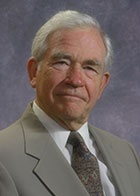
Coons: "The health of the lower-income family is under siege from many an enemy. But none is more insidious than the conscription of its children."
Arguments for subsidized parental choice date to the 18th century. Kept in check by the dominant political mystique that came to favor government schools, the idea lay largely dormant in the U.S. until the 1950s. The sadder realities of monopoly public schooling - especially for the poor - began at last to emerge after World War II, at the same time America was rediscovering the lure of the free market, temporarily obscured by war and depression. The possibility of profound structural reform brought many of us to give a fair hearing to Milton Friedman’s revival of the choice thesis. His prescription seemed simple; if society would subsidize the customers of schooling instead of monopolistic government providers, America would be smarter, and individuals would be freer and more self-satisfied.
To the mind of many hopefuls this looked a good idea, in part for its very simplicity. And, in an important sense, subsidized choice is, indeed, simple. Who needs school boards and their agents to decide where Susie learns her ABCs? As the consumer chooses soap, so the consumer would choose the formal educator.
But in fact school choice differs from the ordinary free market in important ways. And its champions’ own failure to confront these differences in public forums helped scar the rocky political path that choice would have to trudge until this generation. The irony is these very differences and complexities would largely cut in favor of the idea as a realistic political hope. In recent decades the debate happily has opened up, inviting a richer and more balanced discourse and - paradoxically - allowing us to illuminate at least one complexity whose neglect in choice politics had impaired our capacity to grasp implications of school choice far richer and more positive than the picture of the consumer getting her private druthers in a free market.
The central term in market discourse is freedom of the individual, which, properly understood, is a very important idea. And it is true that, for lower-income families, the present regime in schooling represents the antithesis of freedom. Bureaucratic strangers either decide the specific school for the child or closely limit parental choice to public charter schools. To this point the pure market argument was and remains correct. What its champions had failed to explore (and exploit) was their own peculiar twist on the term “freedom,” a concept which in market scripture denotes an act of pure self-determination by the individual who chooses. Choice of schools is hardly such an act, at least in respect of the person most affected - the quite un-free child. Some adult will decide for every boy and girl; the great and only question is: Will the adult be a parent or some complete stranger representing the state? The promotion of parental choice as policy obviously invites more than ordinary market justification.
To say this is in no way to denigrate the role of choice in the achievement of the parent’s own freedom. Indeed, at last it invites the parents’ deep immersion in the individual and social consequences of schooling. In contrast to blind assignment by government, choice of a particular school by fathers and mothers is an act of adult free expression. More, the parental delivery of this message to child and to society is a primary experience for that very adult who has done the choosing. In a vivid way, parents see themselves - perhaps for the first time - as civic actors and, equally important, as responsible players who - unlike the bureaucrats - must live with the consequences. (more…)